Wenn’s schnell gehen muss, und man etwas als Apero auftischen will, dann eignen sich Pestos sehr gut. Viele kennen aber nur das Basilikum Pesto, der Klassiker unter den Pestos, den man zu Teigwaren auftischt. Doch kann man mit vielen Dingen Pesto machen, hier zeige ich euch 2 davon. Doch es gibt bei mir auf dem Blog noch mehr Pestos, zum Beispiel das originelle Pili Nuss Pesto, oder das Rote Beete/Randen Pesto, das Spinat-Pistazien Pesto oder Avocado-Maiskorn Pesto!
Das Wort “Pesto” stammt von “pestare” ab, dem italienischen Wort fuer zerstampfen/zerdruecken, da man urspruenglich Pesto im Moerser zerdrueckt hat. Heute macht man ihn meist im Blender/Mixer, da dies genauso gut, aber viel schneller geht. Aber noch ein Wort dazu, wer’s wirklich geschmacklich gut will, macht das original Basilikum Pesto im Moerser. Der Unterschied ist, dass man beim Moerseren die Blaetter zerdrueckt und so die Oele des Krauts ausdrueckt. Wenn man im Mixer Pesto macht werden die Blaetter einfach gehackt. Die Oele kommen auch raus, aber ich denke, man schmeckt wirklich einen Unterschied!
************
If you’re in a hurry and want to serve something with the drinks, than Pesto is the easiest and best choice. Many of you only know Basil Pesto, the classic pesto you serve with spaghetti. But you can make Pesto out of many different things. Here I give you two recipes. On my Blog I have many more pestos, like the creative Pili Nut Pesto, or the Beetroot Pesto, the Spinach-Pistachio Pesto or Avocado-Corn Pesto!
The word “Pesto” comes from the Italian word “pestare”, which means to pound, to crush. The original method of preparation was with mortar and pestle. Nowadays you best use a blender, it works well and is so much quicker, especially if you use bigger amounts. But a word to this: the difference of blending or pestle it is, that by using the mortar and pestle you squish the leaves and so release the oils of the herb. If you blend them, they get cut and shredded. Of course oil is released but I think I can taste the difference!
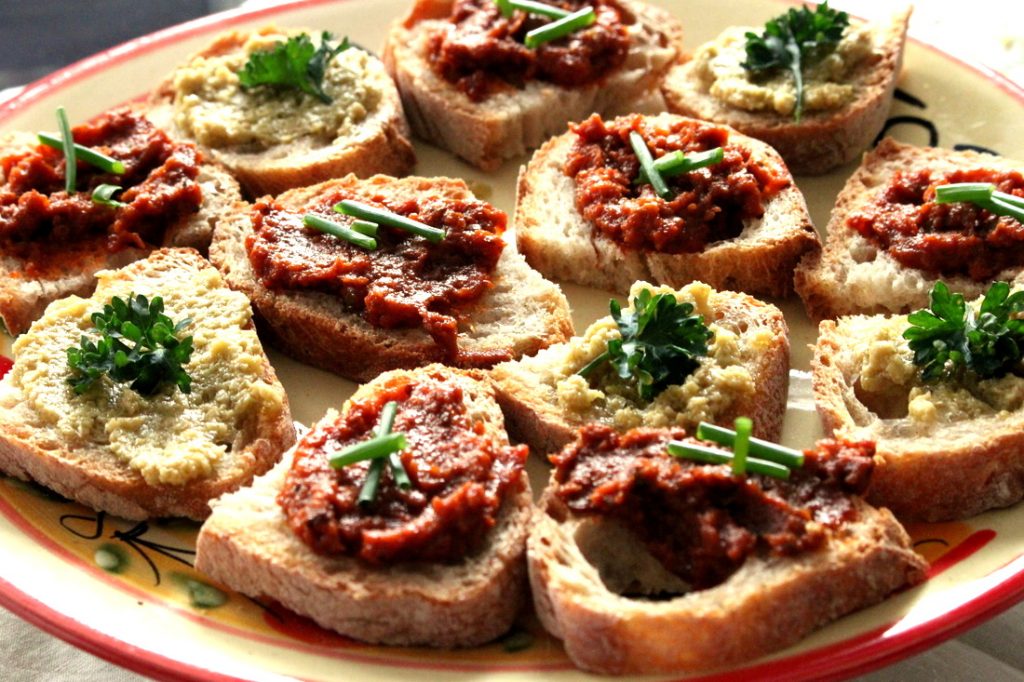
Tomaten Pesto
200 g getrocknete Tomaten in Olivenoel (mit dem Oel verwenden)
50 g geriebener Parmesan
2 Knoblauchzehen
100 ml Olivenoel
1 kleine Chilischote
20 g Pinienkerne
Alle Zutaten in ein Mixglas geben und puerieren. Oder mit dem Moerser gut zerstampfen. In ein sauberes Schraubglas fuellen und mit etwas Oel bedecken. Verschlossen haelt sich das Pesto ca. 3 Monate im Kuehlschrank.
Gruenes Oliven Pesto
150 g gruene entsteinte Oliven
50 g geriebener Parmesan
2 Knoblauchzehen
1 kleine gruene Chilischote
etwas Rosmarin
50 g geschaehlte Mandeln
150 ml Olivenoel
Alle Zutaten in ein Mixglas geben und puerieren. Oder die Oliven etwas zerkleinern, dann mit den anderen Zutaten im Moerser zerstampfen In ein sauberes Schraubglas fuellen und mit etwas Oel bedecken. Verschlossen haelt sich das Pesto ca. 3 Monate im Kuehlschrank.
Alles was man jetzt noch machen muss, ist entweder das Pesto direkt auf Broetchen su geben, ocder die Broetchen zuerst im Ofen etwas anzuroesten, damit sie etwas knuspriger sind. Ich mag dazxu Ciabatta Brot, aber jedes andere roesche Brot geht auch gut. Selbstverstaendlich kann m an diese Pestos auch auf Teigwaren, Fleisch oder Fisch verwenden.
************
Tomato Pesto
200 g dried Tomatoes in Olive Oil (use also the oil)
50 g grated Parmesan
2 cloves of Garlic
100 ml Olive Oil
1 small red Chili
20 g Pine-nuts
Puree all of these ingredients in a blender. Or mash them in the mortar. Fill into a clean jar and cover with a film of olive oil. You can keep the Pesto in the fridge for up to 3 month.
Green Olive Pesto
150 g green Olives, stones removed
50 g grated Parmesan
2 cloves of Garlic
1 small green Chili
some Rosemary
50 g peeled Almonds
150 ml Olive Oil
Puree all of these ingredients in a blender. Or cut the olives and mash with the rest of the ingredients in a mortar. Fill into a clean jar and cover with a film of olive oil. You can keep the Pesto in the fridge for up to 3 month.
All you have to do now, is to put the Pesto on some bread slices, or you could roast the bread slices in the oven to make them crispy and then top with the Pesto. I like to use Ciabatta bread. And of course you can use these Pestos also on Pasta, fish or meat!
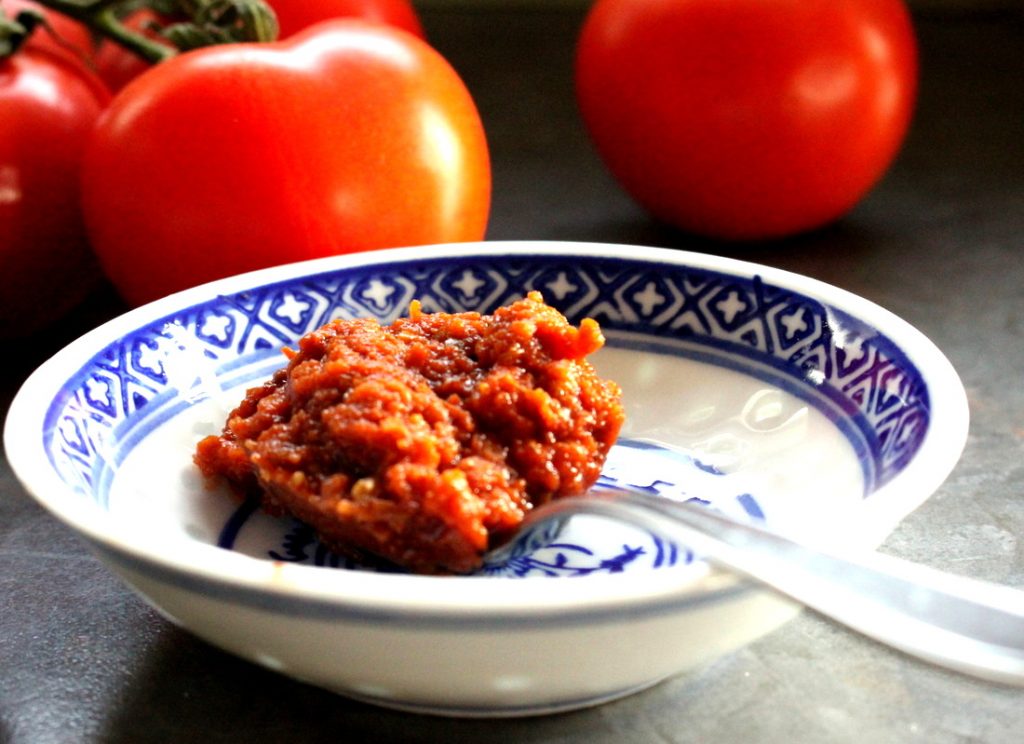
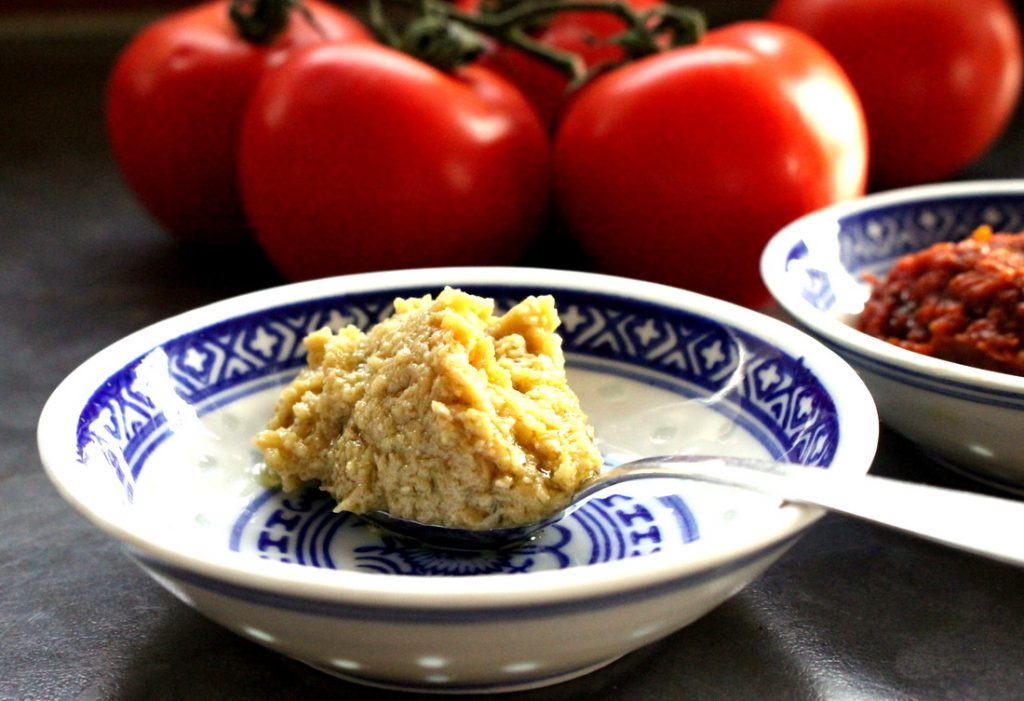
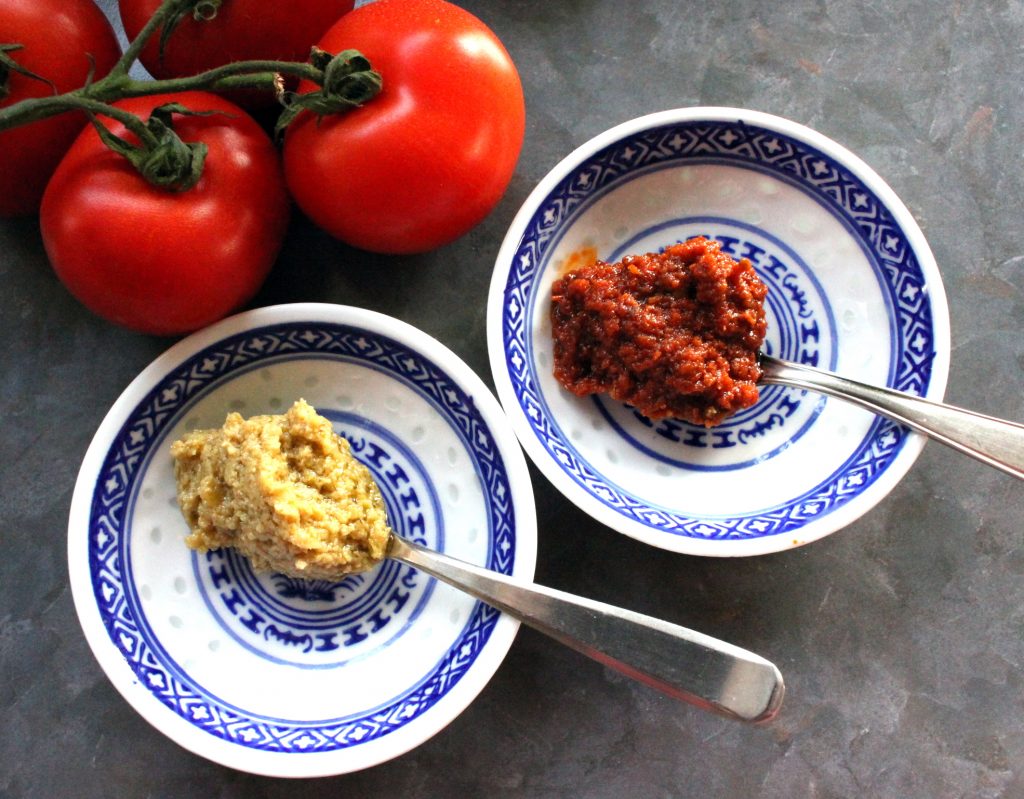
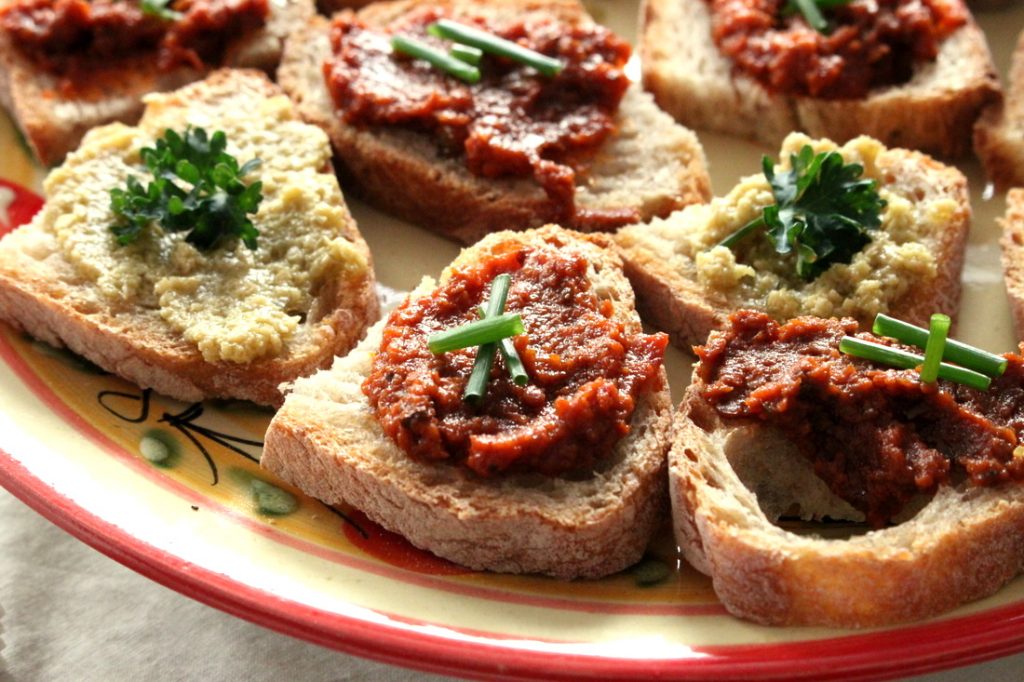
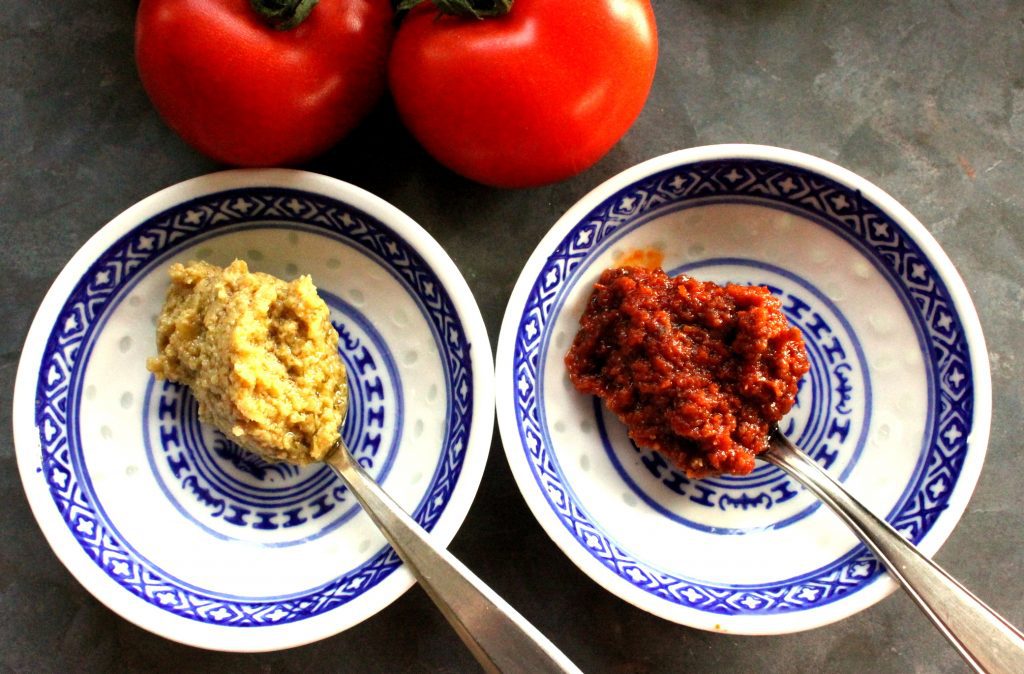
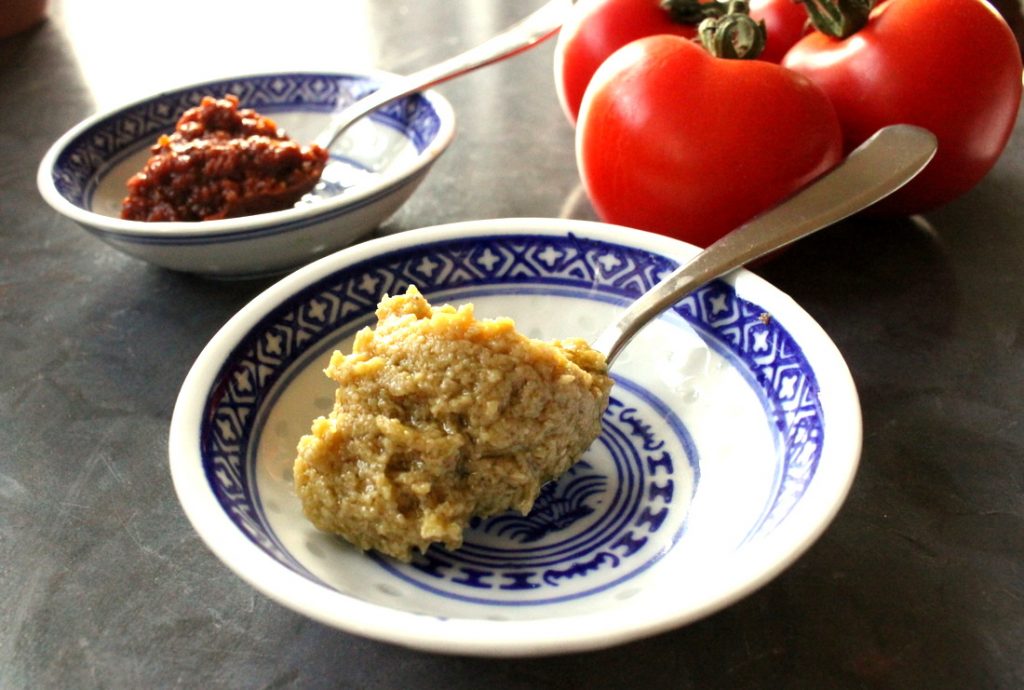
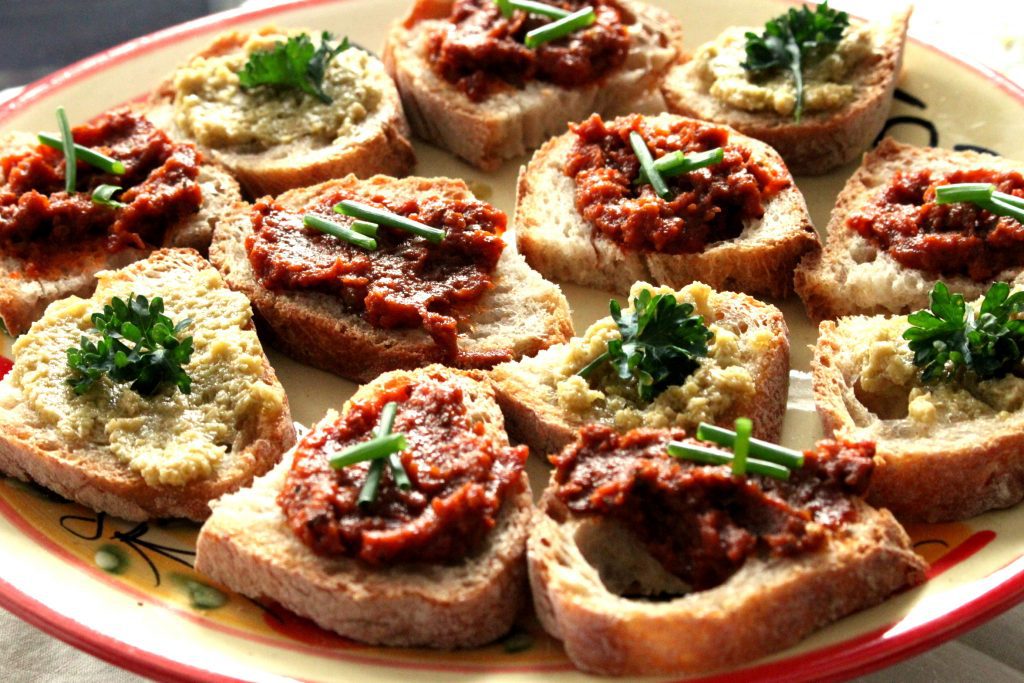





![Validate my RSS feed [Valid RSS]](https://pane-bistecca.com/wp-content/uploads/2024/05/valid-rss-rogers.png)